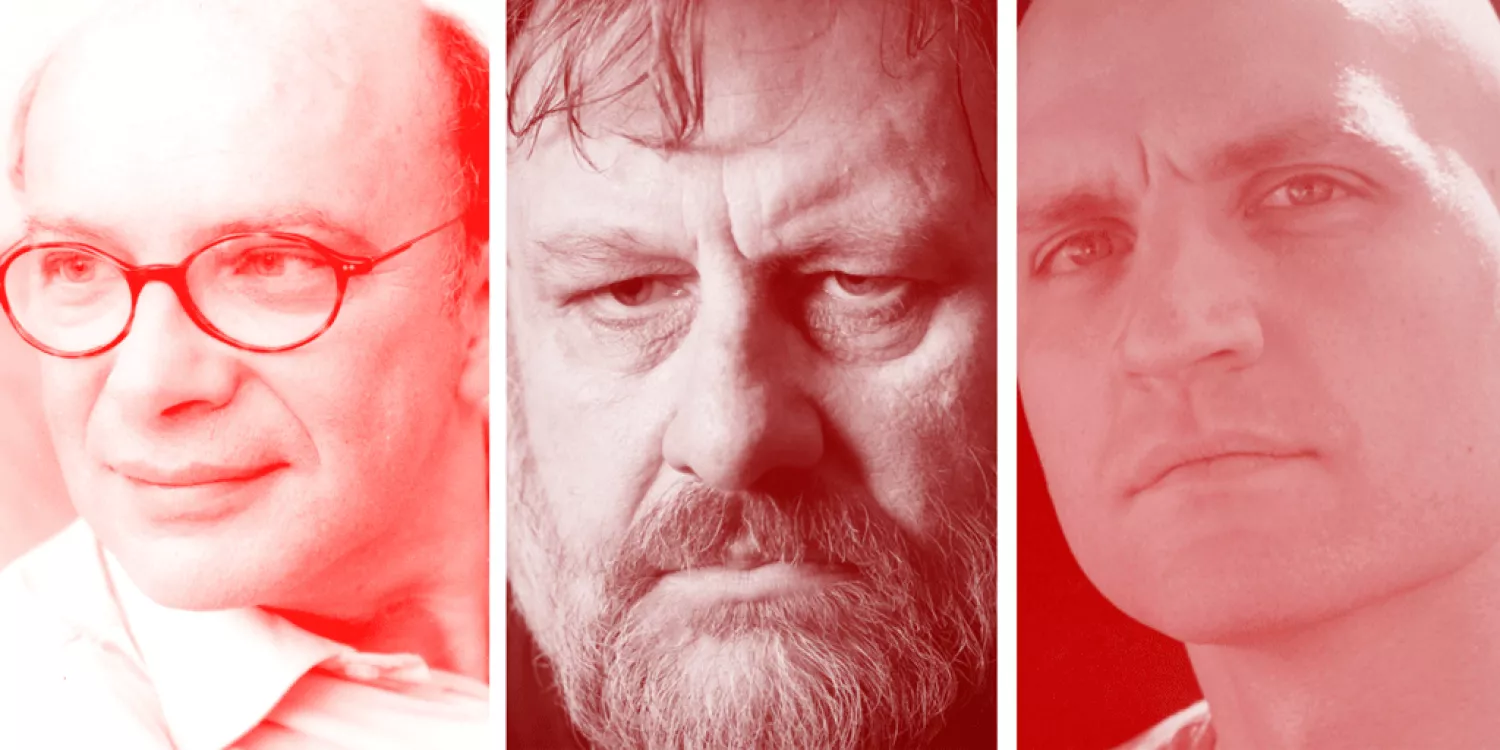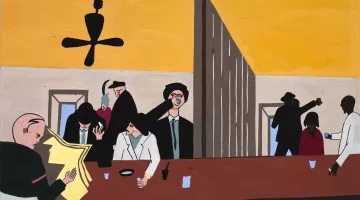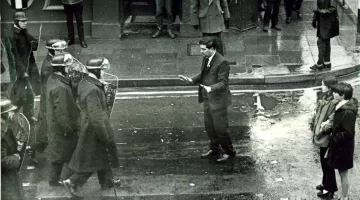Red mist - the legacy of the October revolution
Three new books reveal how we remain conflicted over the Bolshevik revolution, 100 years on

Anniversaries give rise to wistful reminiscences that tap into what Perry Anderson once termed “the history of possibility”: none more so than the Russian Revolution of 1917, though the allure of “October” has greatly diminished since the collapse of the state it spawned. The global triumph of liberal capitalism has distilled the revolution – and the idea of revolution more generally – into a single frightening adjective: totalitarianism.
The descent of all revolutions into totalitarianism is as much a historical inevitability for liberals as the coming proletarian revolution was once an iron law for Marxists. Largely forgotten is George Orwell’s admonition that, while all revolutions tend to end in failure, they do not all produce the same failure.
It was Orwell who first used the term “cold war” to depict the nuclear standoff produced by the allied carve-up of Europe after the Second World War, just as it was another unorthodox left-wing writer, Victor Serge, who first used the word “totalitarianism” in print with reference to Stalinist communism. From exile in Mexico City, as Hitler’s tanks rolled across Europe and the Soviet Union made its deadly pact with fascism during the “midnight of the century”, writing for “the desk drawer alone” Serge looked back on 1917 and saw Bolshevism as containing “the germ of all Stalinism…at its beginning”.
Not much to discombobulate the contemporary liberal there. Famine, terror, prison camps in the frozen steppe, the leather-clad hand of the Cheka officer rapping on the door in the dead of night – all were latent in Lenin’s revolution from the very start, like a bloated maggot in the core of an apple.
Nowadays we tend to leave it there. That Bolshevism might have “contained many other germs”, as Serge added, or that it may be unwise to “judge the living man by the death germs which the autopsy reveals in a corpse”, is seldom considered beyond the dusty rooms above old pubs where the remnants of communist parties still vibrate with hair-splitting dissections of these things. The supposed iron law of revolution – that it produces tyranny like a chicken lays an egg – is bolstered by many of communism’s intransigent, living apologists, who recast and exhort its grisly crimes as acts of virtue rather than, at a most charitable interpretation, crimes of necessity.
In Lenin The Dictator: An Intimate Portrait the Hungarian author Victor Sebestyen provides a good overview of the life of the supposed architect of much of this misery. The book is marked throughout by the peevish tones that animate most liberal accounts of the October revolution. It is a book worth reading, however, not only because it gives an impressively thorough account of Lenin’s life, but because it does more than depict the degeneration of the revolution as the inevitable consequence of ideological fervour.
The execution of his older brother radicalised Lenin
The Russian Revolution was a product of its time and place, and the tyranny it spawned was “a mirror-image of the Romanov autocracy”, Sebestyen writes. Its leading intellectual lights behaved in line with the quasi-religious doctrines of Marxism-Leninism. But to paraphrase Che Guevara’s justification for Cuba’s turn towards the Soviet Union half a century later, the Bolsheviks’ autocratic course was born of the fruit of constraint as well as choice.
A noble by birth, Lenin’s lifelong detestation of liberals and do-gooders – aped today in the affectations of kitsch internet Stalinists – was triggered by the execution of Lenin’s older brother Sasha by the Tsarist authorities for an amateurish plot to assassinate Tsar Alexander III. Sasha’s notoriety meant Lenin’s family was shunned by polite society, meaning in his eyes “The bourgeois…they will always be traitors and cowards.”
The execution of his older brother radicalised Lenin, and in his subsequent desire for revolution he was driven as much by personal revenge against the Tsar as by detestation of autocracy. Lenin was also influenced by the obscure Russian writer and philosopher Nikolai Chernyshevsky as much as by Marx and Engels. In Chernyshevsky’s What Is To be Done? – a novel whose title Lenin would steal for one of his own revolutionary tracts – the hero, Rakhmetev, forsakes all pleasure, eschewing sex and alcohol and eating only raw steak while following a rigorous exercise programme – all sacrifices for the promise of a revolution that will create heaven on earth. Rakhmetev “divides up the day into units of a quarter-hour for each assigned purpose. He is unswerving in his dedication, brutally honest, clinically efficient, coldly rational,” as Sebestyen puts it.
Autocratic systems of government invariably mirror the proclivities of their architects, and there is more than a hint of Lenin’s idol – or “the rigorist”, as his fictional comrades call him in the novel – in the obsessive planning and control of the Soviet Union, as well as in utopian attempts by Lenin’s successors to forge a communist “new man”.
Leninism contained the teleological postponement of morality in the present for the sake of happiness in the future
This obsessive rationalisation of human affairs would attract a certain personality type to communism over the years. The desire to compartmentalise and regiment society appealed to an intelligence that yearned to fashion rigid order out of existential anguish. That communist regimes would so often collapse into militarism – or that Stalinists would sometimes suffer some internal collapse and embrace fascism – was probably more than coincidence. Meanwhile, for the more idealistic, Leninism assumed the role of a surrogate religion. It had its saints and its heretics, but it also had its teleological postponement of morality in the present for the sake of happiness in the future. As a creed Leninism would appeal to academics who wished to solve the riddle of existence like a piece of arithmetic, and it would pull towards it like moths to a flame men and women drawn to any cause which, with the materialist conception of history, held out the tantalising prospect of an answer to every question.
In the end though, the entire mental edifice was propped up by “the necessary lie; the necessary slander; the necessary intimidation of the masses to preserve them from short-sighted errors…the necessary liquidation of a whole generation in the interests of the next,” as ex-communist Arthur Koestler phrased it. With a morbid irony, Koestler’s novel Darkness at Noon set out the process by which many of Lenin’s comrades would willingly succumb to the logic of their own demise in the great terror of the 1930s. “Each wrong idea we follow,” writes the old Bolshevik N.S. Rubashov in his fictional prison diary, “is a crime committed against future generations. Therefore we have to punish wrong ideas as others punish crimes: with death”.
Trotsky’s ghoulish turn of phrase was a barb at a moralising liberal cant emanating from the West
Of the three accounts considered here, Sebestyen’s sticks most faithfully to the mainstream evaluation of Lenin. He was a “zealot” who “lied unashamedly” and had “no great respect for the working classes”. He “never performed a humanitarian act unless it was politically expedient”. And while the political system he founded was “perfected by Stalin”, the ideas which animated it derived from Lenin.
This liberal revulsion might best be summed up by the horror many express at Leon Trotsky’s rejection of the “papist-Quaker babble about the sanctity of human life”. Trotsky was a ruthless authoritarian who called for the sailors of the Kronstadt rebellion – heroes of the revolution who had shed not a single drop of blood in their uprising against Bolshevism in 1921 - to be “shot like partridges”. Already in 1920 he was calling for the militarisation of labour and the complete subordination of trade unions to the state. But Trotsky’s ghoulish turn of phrase was less a monstrous abrogation of all vestiges of human feeling and more a barb at a moralising liberal cant emanating from the West – a cant which could sends millions of young men to die in the mud and clay of a pointless European war before turning to wag a sanctimonious finger at the excesses of the Bolsheviks. Churchill posed as a democrat and blustered against the “foul baboonery of Bolshevism” while millions of “coolies” languished in conditions of semi-slavery in the colonies. The collapse in the value of human life did not began with Bolshevism.
On the eve of the Great War, most Russian Marxists had fallen under the umbrella of the Russian Social Democratic Labour Party. In Europe too Marxists typically formed a wing of their country’s main social democratic party. But in a wave of patriotic fervour, almost all of these parties lined up faithfully behind their respective parliaments to vote for the war, including the German Social Democratic Party, the oldest in the world. “From this moment,” declared Lenin, “I cannot call myself a Social Democrat. I am a Communist”.

Counterfactual history is a fruitless endeavour, but had Europe’s armies done as Europe’s communists wanted and simply shot their officers and gone home, it is difficult to see how the proceeding decades could have turned out any worse than they did. By the end of October 1914, 1.2 million Russian men had either been killed, wounded or were missing in action. The war ultimately delivered the coup de grace to Tsarism, and it was Lenin’s “consistent line against the war [that] was a crucial factor in helping him seize power – and keep hold of it”, as Sebestyen writes. Two decades later the legacy of the war would be used to whip the most advanced nation in Europe into a barbarous frenzy.
Perhaps the great friend of counterfactual Russian history is the short-lived parliament. But by October 1917 the Duma resembled a cut flower in a vase: it gave an impression of vigour but really was already dying, not least because it continued to back the disastrous war. “It seemed obvious to me,” wrote Serge, “that if the Bolshevik insurrection had not taken power at that point, the cabal of old generals, supported by the officers’ organisations, would have certainly done so instead.”
Once he had wrestled power from the short-lived Provisional government, which the Bolshevik leader compared to “picking up a feather”, Lenin set about implementing “war communism” – or what had simply been called “communism” at the time, according to Serge. Bands of armed men were sent out into the vast Russian countryside to requisition grain for the cities from the ‘Kulaks’ (rich peasants), food was rationed and a campaign of terror and censorship was instigated against most forms of dissent.
The British were by far the largest financial backers of the ‘White’ armies, sending £100 million in weapons and aid
One of the most prescient accounts of this period was written by the British socialist Bertrand Russell, who travelled to Russia in 1920. In The Practice and Theory of Bolshevism, Russell wrote of the “militant certainty about objectively doubtful matters” that characterised the communist militants. Bolshevism “is not merely a political doctrine; it is also a religion, with elaborate dogmas and inspired scriptures”. As well as immiserating millions, the ‘scientific’ Marxist dogma which maintained that the entire natural value system was determined by the ownership of the means of production would lead to absurd scientific abominations. In applying the notion of dialectical materialism to nature, Trofim Lysenko’s biological theories maintained that under communism the same species of plant would no longer compete but would aid the growth of the other, like a soldier supporting a wounded comrade.
The expected European revolutions which Lenin had been banking on for the survival of Russian socialism did not materialise, and in the early years the Bolshevik regime stood isolated. Meanwhile the regime’s enemies were chaotically organised but well-supplied by the west. While the civil war against the Bolsheviks raged between 1918 and 1921, the British were by far the largest financial backers of the “White” armies, sending £100 million in weapons and aid. Leading the anti-Soviet forces in the east was forty-three-year-old Alexander Kolchak, who carried around with him a copy of the anti-Semitic Protocols of the Elders of Zion. Jew-baiting was as fundamental to the Whites as anti-communism.
As it retreated from Moscow, Anton Denikin’s anti-Soviet army launched bloody pogroms. “In Chernobyl, Jews were herded into the synagogue and the building was set on fire,” Sebestyen writes. “As they were defeated by the Bolsheviks, the Whites slaughtered about 150,000 civilians”. Major General William Graves, commander of American White forces in Siberia, claimed the Russian anti-Bolshevik armies “killed one hundred people in Eastern Siberia, to every one killed by the Bolsheviks”. As Trotsky would later argue, had the Bolsheviks fallen at this point it might easily have been the Russian rather than the Italian language that bestowed the word fascism on the world.
But the degeneration of Lenin’s regime – the potential for which was always there in the Bolshevik leader’s view of human beings as mere instruments in the inevitable historical process – was hastened by the militarisation that accompanied the civil war. A revolution carries within it many currents, and the current which came to the fore were those of the frontline Bolshevik fighters: unflinching in their willingness to resort to violence to solve problems. “This is Thermidor,” said Lenin in reference to the fall of Robespierre as red military commander Mikhail Tukhachevsky prepared for the bloody assault on the Kronstadt rebels. “But we shan’t let ourselves be guillotined. We shall make a Thermidor ourselves”.
What, then, besides expediency and ideology, produced the vast chasm between the communist promise of universal freedom and the resultant system of bureaucratic domination, exploitation and murder?
In Lenin 2017: Remembering, Repeating and Working Through the Slovenian Marxist Slavoj Žižek is at least honest enough to admit that what he calls the Bolshevik revolution’s “reversal into Stalinism” had Leninist roots and that the communist project, even while Lenin lived, had “failed, even failed monstrously”. But he seems to spend much of his book defending the very ‘substitutionism’ that Trotsky had predicted in 1904 would arise out of Lenin’s concept of an elite vanguard party. Leninism, Trotsky wrote prophetically, would produce a form of government in which “the organisation of the party substitutes itself for the party as a whole; then the Central Committee substitutes itself for the organisation; and finally the ‘dictator’ substitutes himself for the Central Committee”.
Žižek therefore calls for a repeat of Lenin rather than a return to Lenin. The purpose of this somewhat foggy distinction is to prize apart Leninism in practice (even under Lenin) from the “field of possibilities” opened up by the Bolshevik seizure of power. This is not particularly profound and could be said about most revolutions. The example that immediately comes to my own mind is the Cuban revolution, in which the seizure of power by Fidel Castro’s guerrilla band was necessary for the flowering of liberty, but, as the Cuban people soon found out, was no guarantee of it. Yet the liberal conception of revolution without bloodshed – witness the hyperventilation on the American right over the relatively modest number of executions meted out in the very early days of Castro’s revolution, the same people having not emitted a squeak when General Batista murdered 10 times that number to protect their dividends – is like a shower without water. As revolutions go, the Bolshevik seizure of power was relatively bloodless.
Truth is whatever serves the revolution – and by extension – the party
Žižek is admirably candid in his willingness to acknowledge the crimes of Leninism without feeling the need to perform the familiar trick of dumping the whole repressive legacy onto Stalin’s head. Yet he fails to identify at least one of the seeds of future revolutionary degeneration in Lenin’s interpretation of what Robespierre called the “voice of truth”. It is one thing to state, as Žižek does, that democratic elections are “not per se an indication of the truth”, but it is quite another to deduce from this, as Lenin does, that truth is whatever serves the revolution – and by extension – the party. It is from here that much of the moral flexibility in Leninist doctrine is derived: the claim to be in possession of a historical truth that differs from conventional religion only in its “scientific” pretence. Just as the party vanguard is liable to substitute itself for the proletariat, so the state becomes the unquestionable arbiter of the truth. Anything is justified if it furthers the interests of the state and – by extension – the revolution. It was not some aberration of the essence of Leninism which resulted in the Communist International pursuing a policy that was indistinguishable from the interests of the Soviet state over the years.
China Miéville has written a softer, narrative-driven book that casts the romantic eye of a novelist on events of October whilst occasionally slipping into the realm of hagiography. October: The Story of the Russian Revolution contains little of the moral certainty of Sebestyen’s book, but Lenin and the Bolsheviks emerge favourably from almost every twist and turn in the months leading up to October (the chapters of the book are named after the months of the year that fell between the overthrow of the Tsar in February and the disposal of the Provisional government in October). Miéville is thoughtful enough to recognise that the left must “engage” with the “failures and crimes” of Lenin and his revolution, but in only focusing on the pre-October period you get a sense that he has consciously avoided doing just that. What you get is the enthralling romance of thwarted possibility rather than a set of challenging questions.
It is easy enough today to see how, once Lenin and the Bolsheviks had seized power and dispersed the Constituent Assembly by force after receiving just a quarter of the votes, Leninism descended into a totalitarian system buttressed by a vast network of brutal labour camps. But a willingness to sacrifice others to grand ideological visions is not the preserve of Marxism-Leninism. When Lenin was first exiled to Siberia in 1897, Victorian imperial sweatshops operated on the utilitarian basis that capitalist progress would ultimately benefit humanity. As long as one’s own children were not being sent up blackened chimneys or down filthy mines, one could wax optimistically about the onward march of industrial civilisation. The important thing was that it all came at someone else’s expense. An echo of this attitude can be heard today in the Pollyanna pronouncements – typically in response to some call for better labour protections – to the gist that capitalism is “dragging millions of people out of poverty”. Only an idiot would disagree of course. But pompous evocations of this sort – of progress and of the “inalienable rights of man” – rarely come from the mouths of those making the wheels turn. One suspects they would settle for something a little less grandiose, such as a legally limited working day.
Had Lenin lived longer it is doubtful the revolution would have avoided its descent into the sort of butchery which characterised Russia in the 1930s. It is noticeable, reading the testimonies of the old Bolsheviks who would eventually be bumped off by Stalin, how they were far more outraged by the fact that Stalin was murdering other communists than by the system’s tendency to snuff out human life tout court. Once an elite begins to distinguish between itself and “former people”, “kulak spiders” and “bloodsuckers” – all the while unleashing “unrestrained power and the use of force, not law”, in Lenin’s words - it is not a huge jump to institutionalised mass murder. It was Lenin after all who signed into law both the ban on factions within the Bolshevik party and what would later become the notorious article 58 of the Soviet Penal Code, under which it became a crime “not to recognise the right of the Communist system of ownership to replace capitalism and attempt its overthrow”.
But it is a mistake to think of the notorious Stalinist dictum that one “can’t make an omelette without breaking eggs” as a unique moral judgement on communism. The early 20th century capitalist order broke its fair share of eggs. However unlike communism it produced a worthwhile omelette in the end, which I suspect is where much of the distinction rests. History is written by the victors, as the truism goes. As such, the mound of corpses it leaves behind are never totted up quite as meticulously as those piled up by the losing side.
Lenin The Dictator: An Intimate Portrait is published by W&N
October: The Story of the Russian Revolution and Lenin 2017: Remembering, Repeating and Working Through are published by Verso




